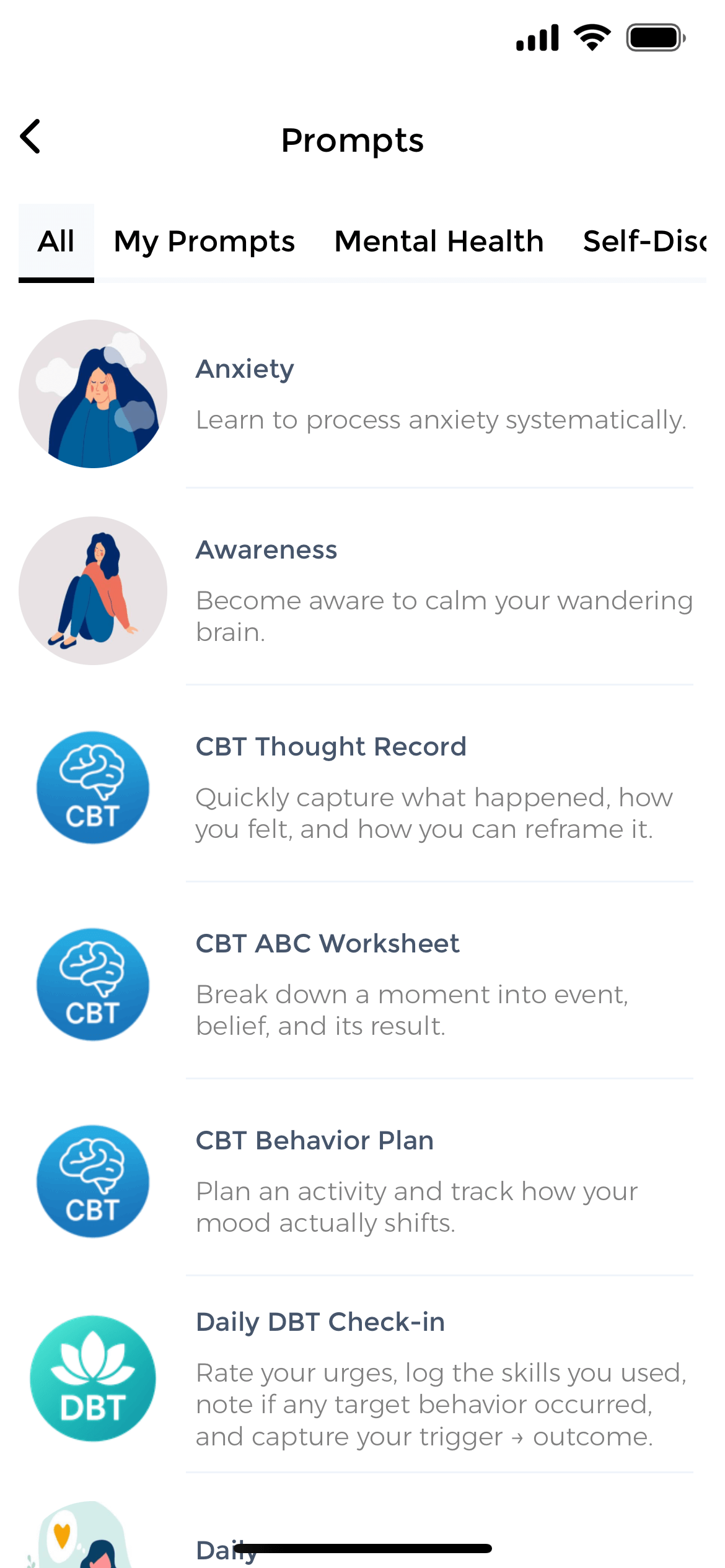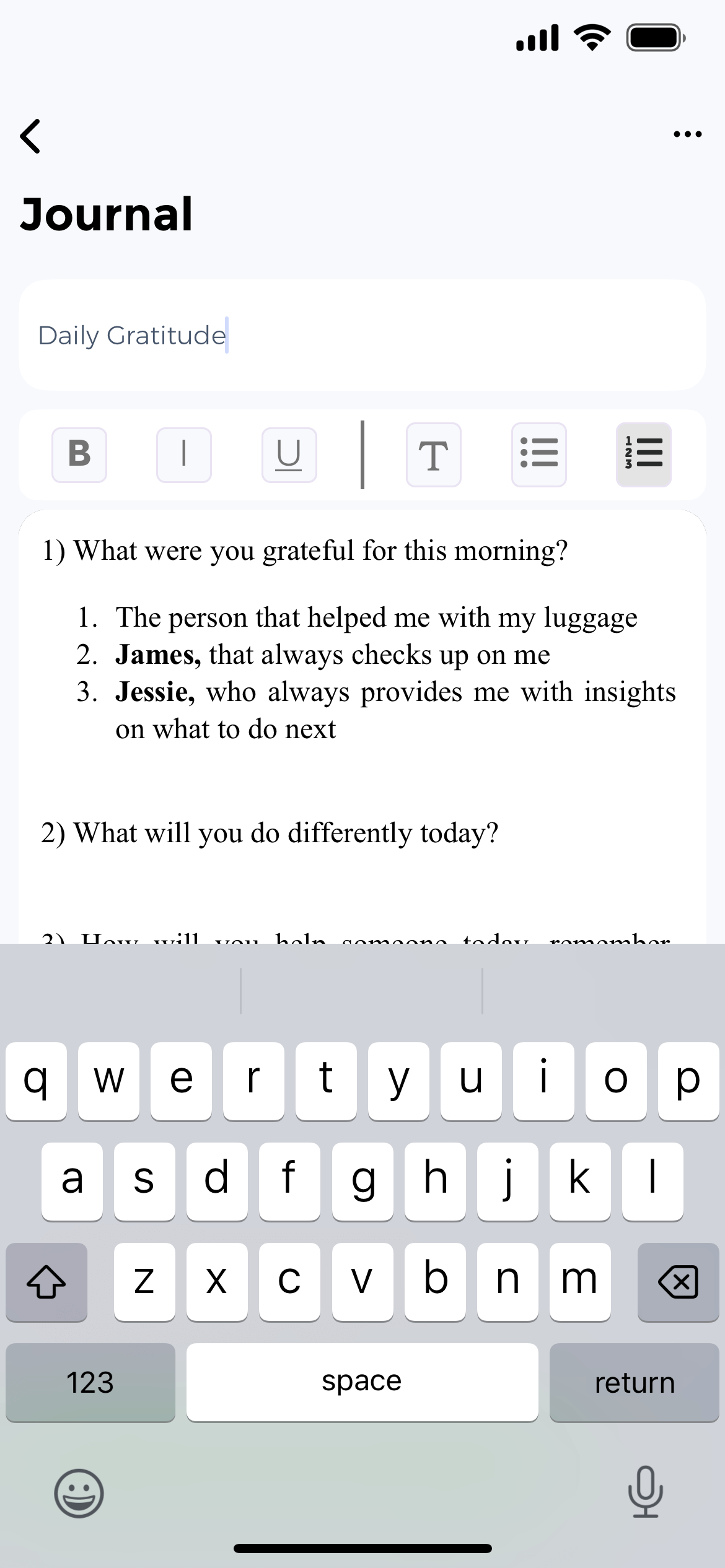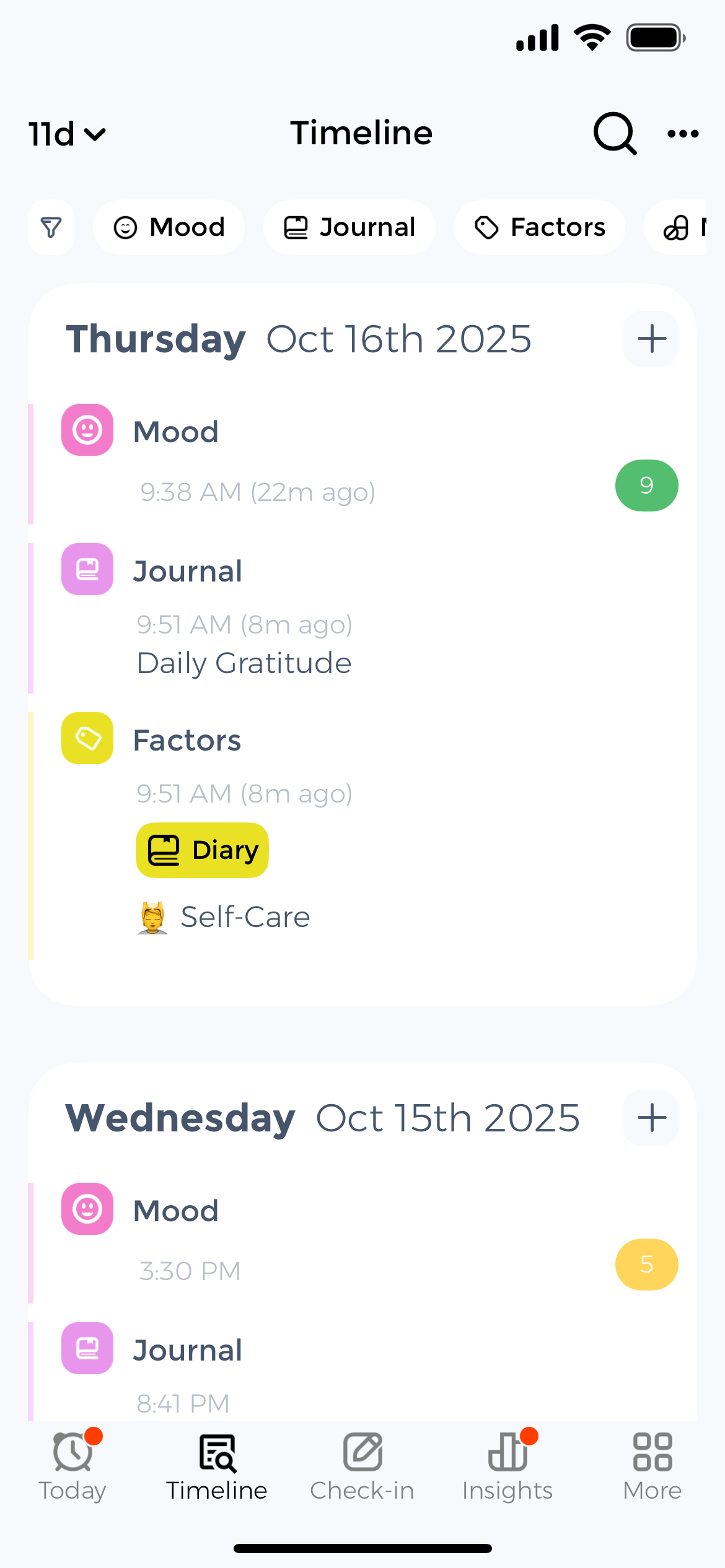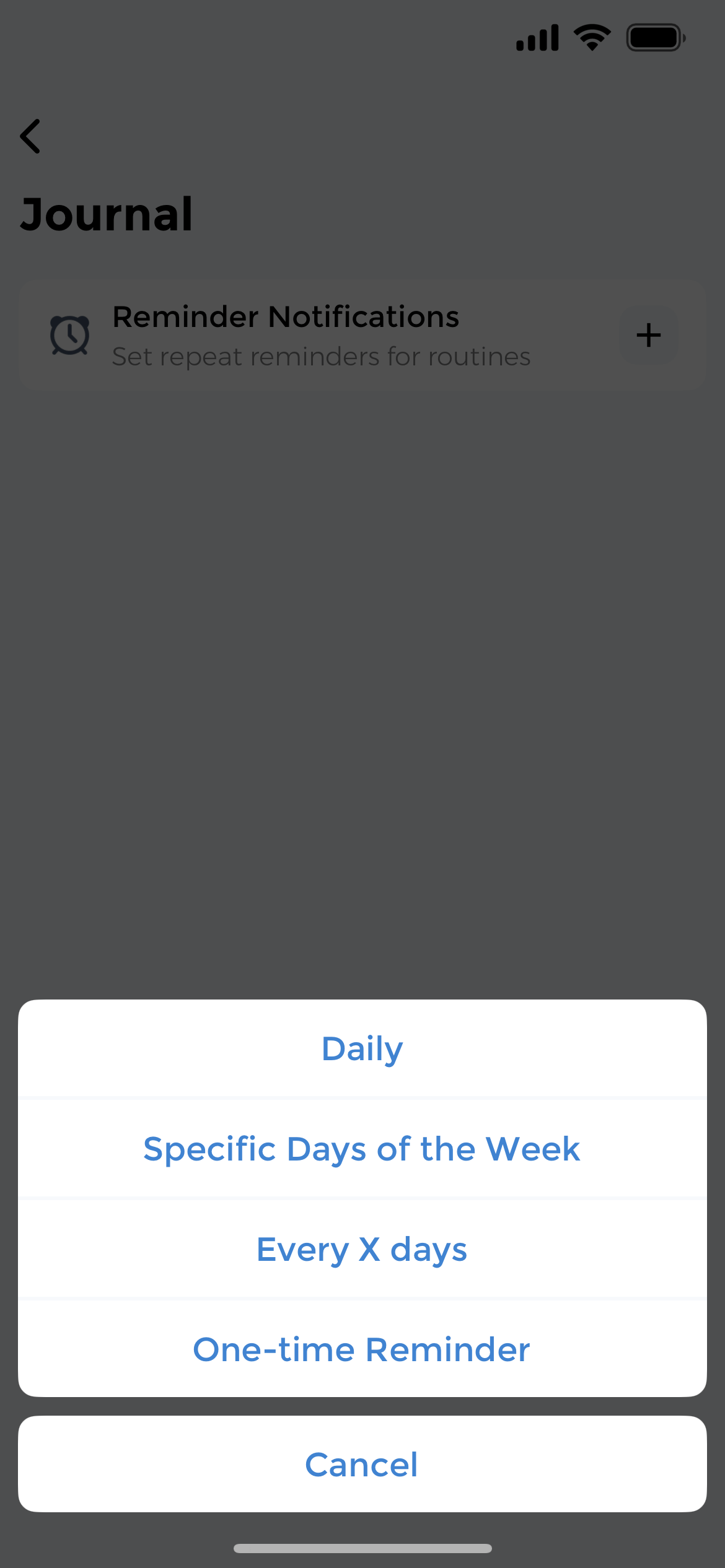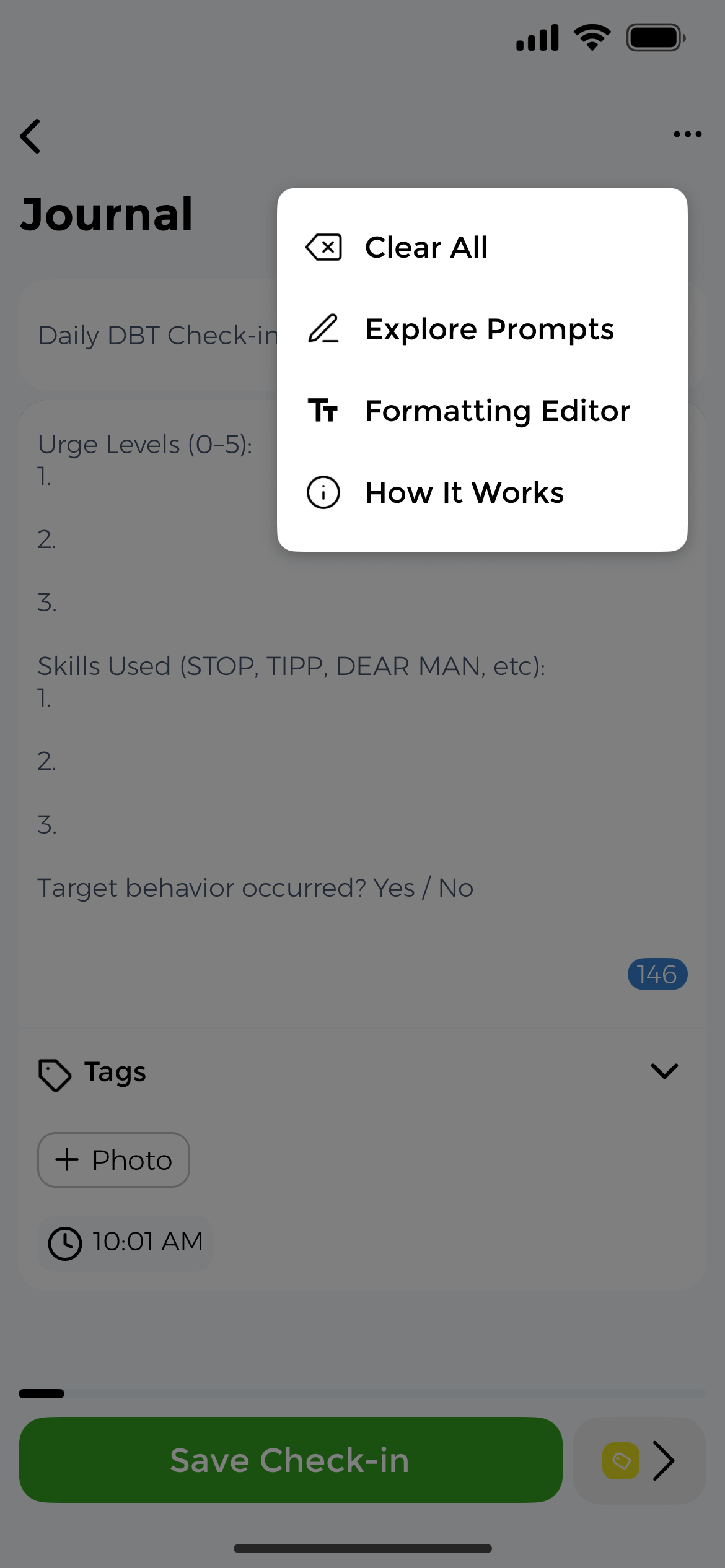Health Journal App
Your complete health journal for tracking symptoms, medications, and daily wellness.
The best health journal app and wellness tracking app for keeping a medical journal. Log symptoms, track mood, manage medications, and discover health patterns with AI-powered insights. Used by patients and healthcare providers as the leading patient journal app.
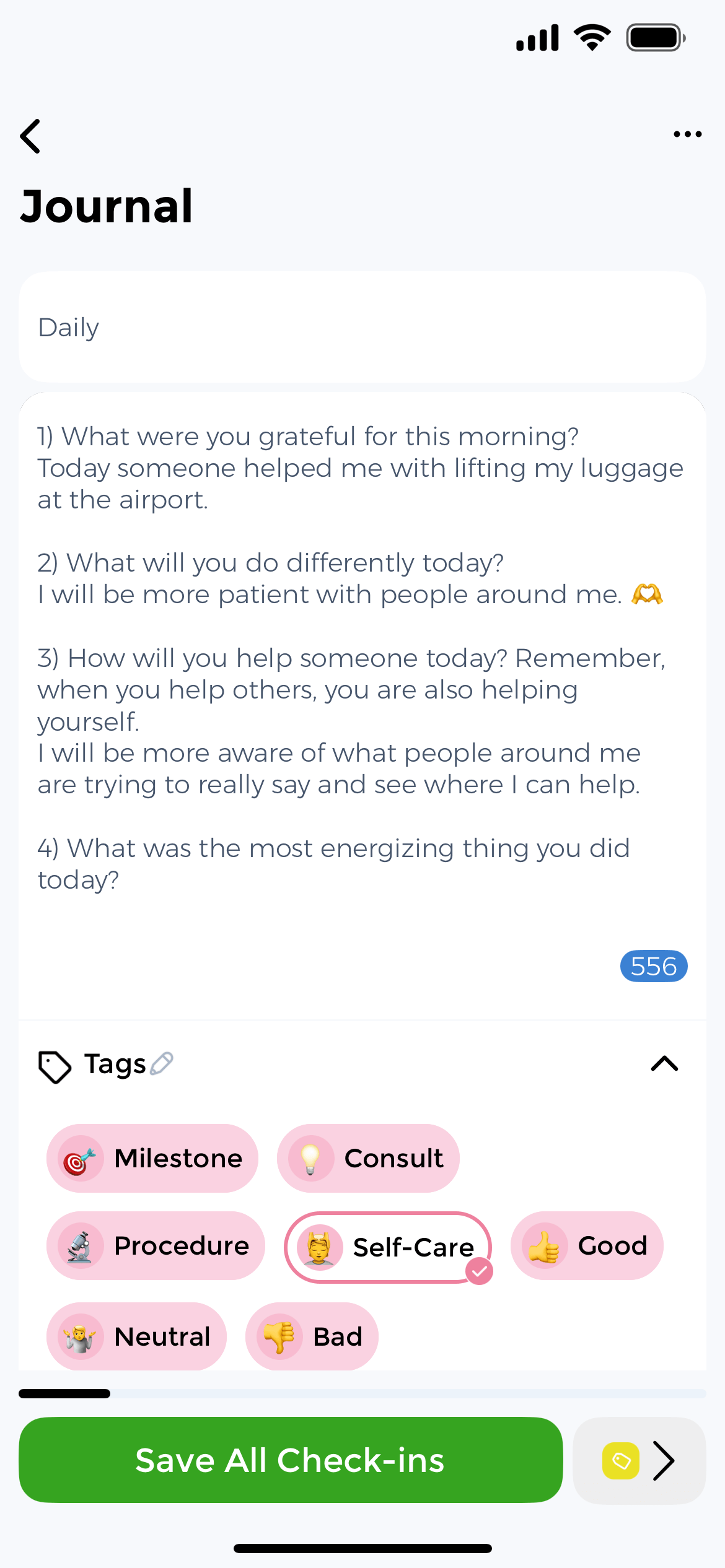
Why Keep a Health Journal?
A medical journal app helps you discover patterns between symptoms, medications, mood, and lifestyle. Keep a daily health log to understand what affects your health and share insights with your healthcare team.
How it works.
1. Download & Set Up
Get the free health diary app on iOS or Android. Sign up with email or social login in seconds.
2. Choose Templates
Select from 100+ evidence-based prompts or create custom health journal entries for your needs.
3. Discover Insights
Build a complete health history and spot patterns between symptoms, treatments, and daily habits over time.
Beyond Basic Health Diary Apps
Basic health diary templates and simple medical log apps miss patterns your doctor needs. Our AI-powered health diary app reveals hidden correlations other tools can’t find.
Problems with Basic Tracking
Paper Health Diary Templates
Traditional medical diary book and health journal templates get lost, can’t analyze patterns, lack healthcare calendar app features, and offer no medication reminders. You need a digital health diary app that actually helps.
Basic Health Log Apps
Simple daily health log tools and basic medical log book apps track single metrics but miss correlations. No mental health diary app features, food diary app for gut health integration, or comprehensive health tracking capabilities.
Generic Diary Apps
Regular diary app tools lack medical journal app features like symptom severity tracking, medication logs, or health record application capabilities. Most apps fall short.
CareClinic Health Diary Solution
✓ Complete health tracking journal app
Combining medical diary, mental health journal app, and gut health diary app features in one powerful platform
✓ AI-powered daily medical diary app
Identifies patterns your doctor needs. The best health diary app with correlation analysis that turns data into insights
✓ Medical records app with reports
Professional health summaries. The top medical journal app for patients and providers with export capabilities
✓ Healthcare calendar app integration
Smart reminders for medications, appointments, and medical diary entries to keep you on track
✓ Apple health journal & Android sync
Works across all devices with real-time synchronization for your complete health history
Journaling Prompts & Templates
Start keeping a health journal with 100+ evidence-based prompts. Access CBT worksheets, DBT check-ins, gratitude exercises, and custom health journal templates.
Track Gratitude & Reflection
This health planner app includes dedicated gratitude logging and reflection exercises proven to improve mental health and overall wellness. Use our health diary template for daily gratitude practice.
Benefits of Gratitude Journaling:
Improved Mood: Daily gratitude reduces depression symptoms by 23% in clinical studies
Better Sleep: Gratitude logging before bed improves sleep quality and duration
Stress Reduction: Regular reflection decreases cortisol and anxiety levels
Enhanced Relationships: Tracking positive interactions strengthens social connections
Timeline of Your Health Journey
See all your health data in one chronological health log. Track patterns over days, weeks, and months. This patient journal app creates a complete timeline of your health journey.
Comprehensive Health History
Your health log app automatically organizes all entries by date and time. Filter by mood, journal entries, symptoms, medications, or factors to see specific aspects of your health journey.
- Multi-Type Entries: View all entries, moods, symptoms, and medications in one timeline
- Category Filtering: View specific entry types like “Diary” or “Self-Care” to focus on what matters
- Timestamped Precision: Every entry shows exact time logged for accurate pattern detection
- Daily Summaries: Grouped by date to see how each day unfolds in your medical diary
- Export Timeline: Generate PDF reports of any date range for doctor appointments
- Mood Tracking Monitor emotional states and identify triggers
- Symptom Monitoring Track intensity, frequency, and patterns
- Medication Management Log doses, set reminders, track adherence
- Therapy Sessions Document progress and therapeutic insights
- Sleep Quality Analyze rest patterns and factors
- Nutrition Logging Connect diet with health outcomes
Start Keeping a Medical Journal Today
Join 500,000+ people using CareClinic as their health diary app, symptom journal app, and wellness journal app. Track what matters, discover patterns, and take control of your health journey.
Health Journal for Chronic Conditions
Regular journaling supports chronic condition management, mental health treatment, and preventive care. Monitor symptoms and treatment effectiveness with detailed health journal templates and tracking sheets.
Diabetes & Blood Sugar Management
Track blood glucose patterns with meals, medications, and activity. Identify triggers and optimize treatment for better glycemic control.
Depression & Anxiety Disorders
Monitor mood with CBT thought records and DBT check-ins. Track medication effectiveness and therapy progress for evidence-based treatment adjustments.
Hypertension & Heart Disease
Log blood pressure trends with diet, stress, and medications. Correlate cardiovascular symptoms with lifestyle factors for comprehensive management.
Chronic Pain & Arthritis
Map pain severity to weather, activity levels, and treatments. Document symptom progression for specialists and adjust pain management strategies.
Autoimmune Diseases
Track flare-ups, inflammation markers, and immunosuppressant effectiveness. Monitor disease progression for rheumatology and immunology specialists.
Migraine & Headache Disorders
Identify trigger combinations including food, stress, sleep, and hormonal changes. Optimize preventive medications and abortive treatments.
Reminders for Daily Logging
Never forget to update your health diary with customizable reminder notifications. Set daily, weekly, or custom schedules for keeping a medical journal consistently.
Reminder Options
Daily Reminders
Same time every day for consistent logging
Specific Days
Choose which days of the week to log
Every X Days
Custom interval-based reminders
One-Time Reminder
For special health events or check-ins
All Features in One
This comprehensive wellness journal app combines symptom tracking, medication management, mood logging, and more.
Rich Text Formatting
Format your health log entries with bold, italic, lists, and more for clear medical documentation.
Category Tagging
Tag entries as Self-Care, Therapy, Milestone, Procedure, or create custom categories.
Photo Attachments
Add photos to your medical diary entries for visual symptom tracking or medication documentation.
HIPAA Compliant
Bank-level encryption keeps your health log app data private and secure.
CareClinic vs Other Apps
Most health apps track single metrics while missing the bigger picture. CareClinic connects all your health data to reveal hidden patterns and correlations. See more comparisons →



